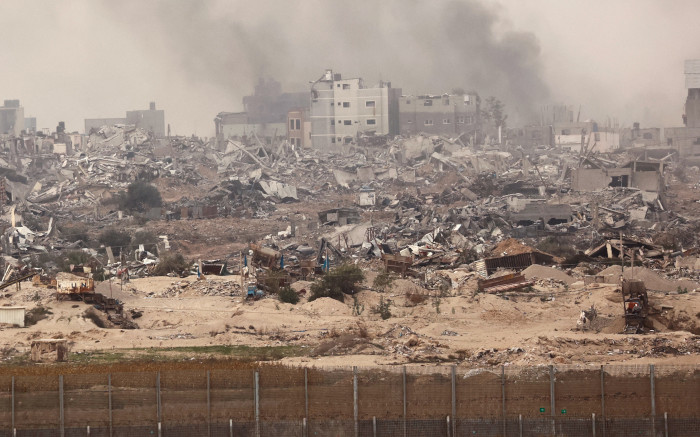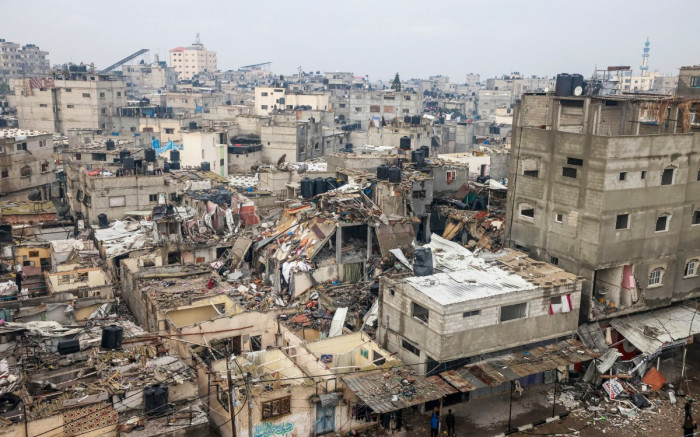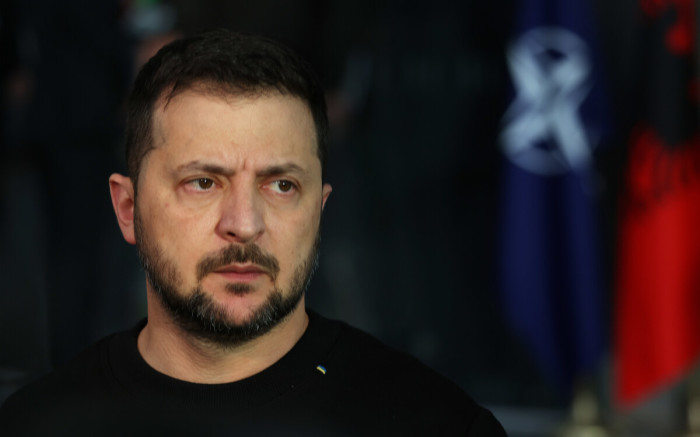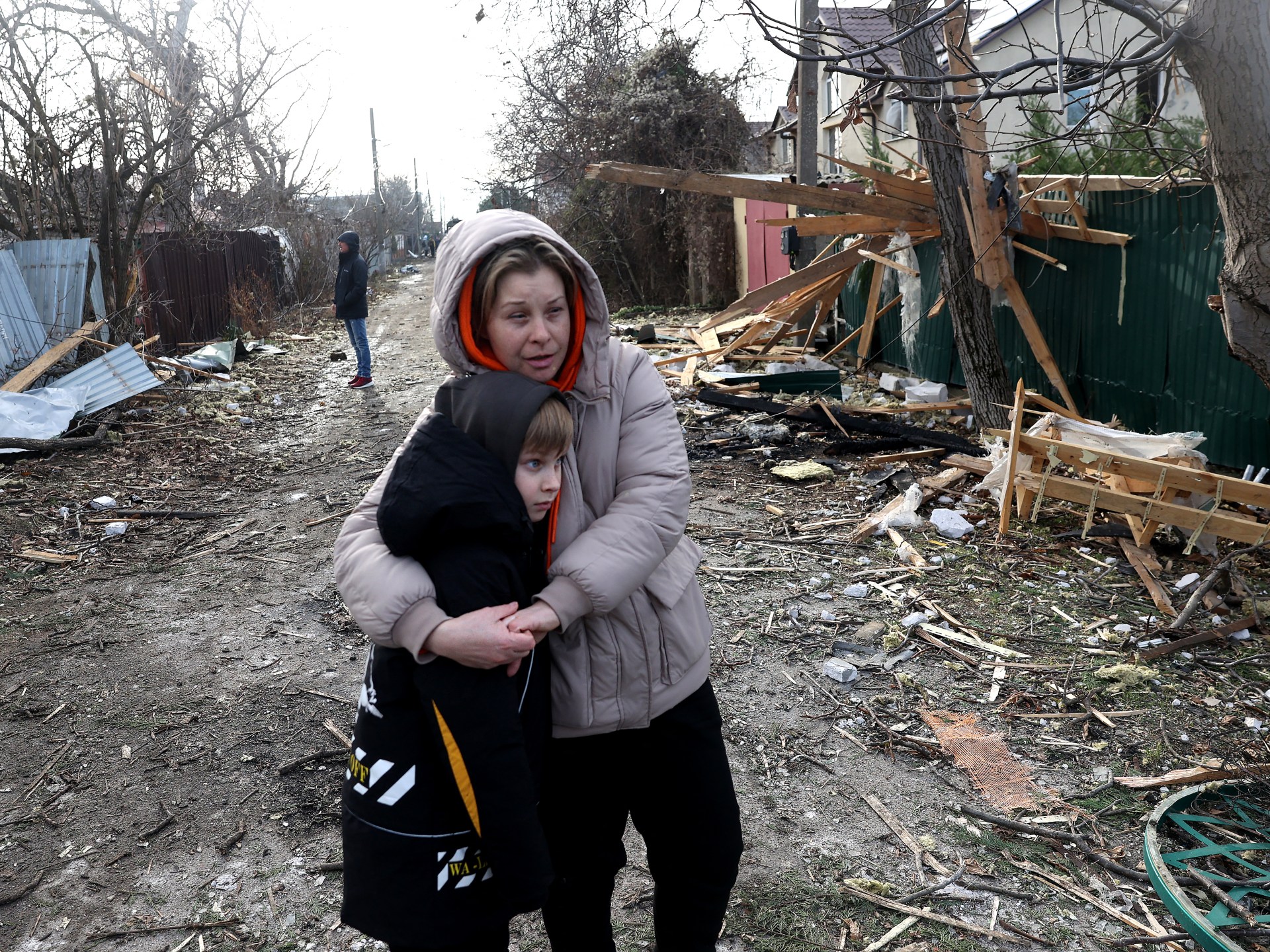
Israeli attacks hit the town of Khan Yunis on Monday, an AFP correspondent reported, while Palestinian Islamic Jihad militants said they blew up a house where Israeli soldiers were searching for a tunnel shaft.
An image taken from southern Israel near the Gaza Strip border shows smoke rising during an Israeli attack on the Palestinian territory on December 10, 2023, amid ongoing fighting with the Palestinian Hamas group. Image: GIL COHEN-MAGEN/AFP
JERUSALEM – Israel bombed the capital of the southern Gaza Strip on Monday after Hamas warned that no Israeli hostages would leave the territory alive if their demands for the release of prisoners were not met.
Hamas sparked the conflict when the group carried out the deadliest attack ever on Israel on October 7, killing 1,200 people and returning about 240 hostages to Gaza, according to Israel.
According to the Hamas-run Health Ministry, Israel responded with a military offensive that reduced much of the Gaza Strip to rubble and killed at least 17,997 people, mostly women and children.
Israeli attacks hit the town of Khan Yunis on Monday, an AFP correspondent reported, while Palestinian Islamic Jihad militants said they blew up a house where Israeli soldiers were searching for a tunnel shaft.
The army reported rocket fire from Gaza into Israel on Monday and said heavy fighting broke out around Gaza City and Khan Yunis on Sunday.
Hamas warned on Sunday that Israel would not accept “its prisoners alive without exchanges and negotiations and without meeting the demands of the resistance.”
Israel says there are still 137 hostages in the Gaza Strip, while activists say around 7,000 Palestinians are in Israeli prisons.
Months of heavy bombardment and clashes have left Gaza’s health system on the brink of collapse, with most hospitals dysfunctional and nearly two million people displaced.
AFP visited the bombed-out ruins of Al-Shifa Hospital in Gaza City and found at least 30,000 people seeking refuge in the rubble after Israeli forces stormed the medical facility last month.
“Our lives have become hell, there is no electricity, no water, no flour, no bread, no medicine for the children, who are all sick,” said Mohammed Daloul, 38, who fled there with his wife and three children is.
“COLLAPSEING” HEALTH SYSTEM
The United Nations estimates that 1.9 million of the 2.4 million people in the Gaza Strip have been displaced from their homes – around half of them are children.
Israel had urged people to seek refuge in the south, but after the war expanded to southern targets there are few safe places for civilians.
Humanitarian organizations continued to press Israel for better protection of civilians in the conflict.
Lynn Hastings, UN humanitarian coordinator for the Palestinian territories, on Sunday condemned as inadequate the mapping software used by the Israeli army to reduce civilian deaths.
“A unilateral declaration by an occupying power that areas lacking infrastructure, food, water, health care or hygiene are ‘safe zones’ does not mean they are safe,” she said.
According to the United Nations humanitarian agency OCHA, only 14 of Gaza’s 36 hospitals are fully operational.
“Gaza’s health system is devastated and collapsing,” said Tedros Adhanom Ghebreyesus, head of the World Health Organization, as the organization called for immediate and unhindered aid deliveries.
Israel’s army chief Herzi Halevi said on Sunday his troops would use “significant force” in Gaza and praised “significant successes” in the war.
The military said Sunday it struck more than 250 targets in 24 hours, including “a Hamas military communications site,” “underground tunnel shafts” in southern Gaza and a Hamas military command center in Shejaiya in Gaza City.
It is said that 98 soldiers died and around 600 were injured in the Gaza war.
According to National Security Advisor Tzachi Hanegbi, around 7,000 “terrorists” were killed.
“Hamas should not exist because they are not human, from what I have seen,” Menahem, a 22-year-old soldier who was wounded on October 7, told AFP during a military-organized tour he was not allowed to take part his last name.
United Nations credibility “undermined”
U.N. Secretary-General Antonio Guterres said on Sunday that the “authority and credibility of the Security Council had been significantly undermined” after the United States blocked a ceasefire resolution on Friday.
“I can promise that I will not give up,” Guterres said at a meeting of heads of state and government in Qatar.
Qatar, where Hamas’ top leadership is based, said it was still working on a new ceasefire like the week-long truce it brokered last month in which 80 Israeli hostages were exchanged for 240 Palestinian prisoners and humanitarian aid.
But Israel’s relentless bombing is “narrowing the window” for success, Qatari Prime Minister Sheikh Mohammed bin Abdulrahman Al Thani said.
US Secretary of State Antony Blinken again rejected a ceasefire on Sunday.
“With Hamas still alive, still intact and … with the stated intention of repeating October 7 over and over again, that would simply perpetuate the problem,” he told CNN.
But Blinken also said the United States is “deeply aware of the terrible human toll this conflict is taking on innocent men, women and children.”
There are fears of regional escalation, with frequent cross-border clashes between Israeli and Lebanese militants and attacks by pro-Iranian groups against US and allied forces in Iraq and Syria.
The Syrian state news agency said Israel carried out strikes near Damascus late Sunday but air defense systems prevented major damage.
The Syrian Observatory for Human Rights war monitor said the strikes hit Hezbollah sites in the Sayeda Zeinab district and near Damascus airport.
Meanwhile, Iran-backed Houthi rebels in Yemen threatened to attack all ships heading to Israel unless more aid could reach the Gaza Strip.
France said on Sunday one of its frigates in the Red Sea shot down two drones launched from Yemen.






Recent Comments